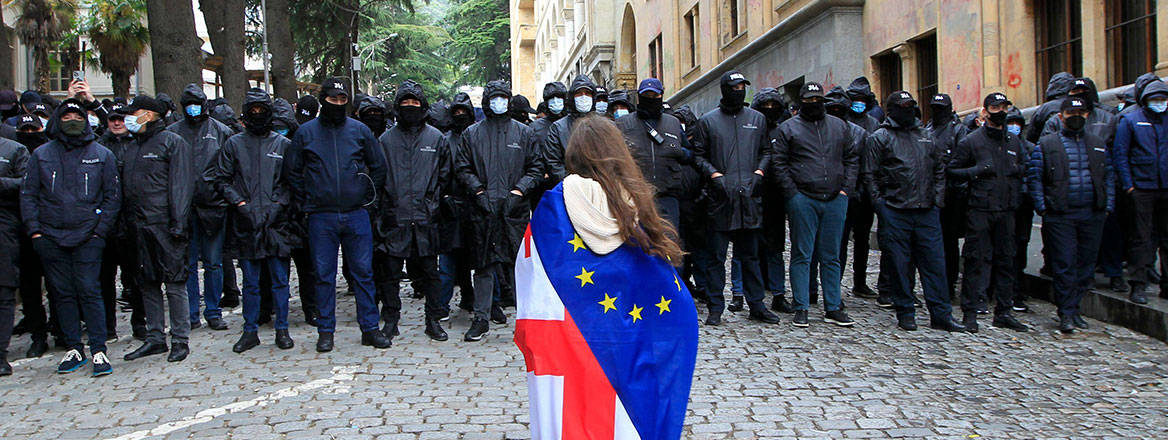Although the initial furore around Georgia’s recently introduced ‘foreign agents’ law has died down, the upcoming elections will be crucial in determining whether the country continues to drift away from a pro-Western course or moves closer to EU integration.
Following weeks of mass protests in April and May 2024 due to the adoption of the controversial foreign agents law, all seems relatively quiet again on the Georgian front. Some of the largest protests that the country has seen in the recent past were followed by a rare celebration resulting from the success of Georgia's national football team, which qualified for the European Championship for the first time in its history and reached the knockout stages. The footballing success temporarily brought the country together. Yet, the euphoria has already subsided as Georgia faces one of its most decisive elections in October 2024. For now, it seems that the protesters are taking a strategic pause in order to regain momentum in the autumn if needed.
Georgia’s European and Euro-Atlantic Aspirations at a Standstill
In the meantime, the US and the EU are reviewing their relationship with Georgia, marking the lowest point in Georgia’s relationship with the West since Tbilisi adopted a pro-Western foreign policy stance in the early 2000s. On 5 July 2024, the US government decided to indefinitely postpone the annual Noble Partner exercise, which was supposed to be held later in July in Georgia. The decision was made as part of a ‘comprehensive review’ of the US–Georgia bilateral relationship that was initiated due to the reintroduction of the law ‘on transparency of foreign influence’ in conjunction with accusations that the US was aiming to open a second front in Georgia and participating in coup attempts against the ruling party. Additionally, the US has also paused $95 million of assistance to the Georgian government.
The EU Ambassador to Georgia Pawel Herczynski furthermore confirmed that Georgia’s EU accession process has been halted for now, and the EU has frozen €30 million worth of funding for Georgia from the European Peace Facility. Individual EU countries such as Germany and France have decided to hold back from new financial commitments to the Georgian government. The NATO Washington Summit was also not a success for Georgia. For the first time since the Bucharest Summit in 2008, the final declaration did not reiterate the promise that Georgia would eventually become a member of NATO.
The protesters see an immediate connection between the so-called foreign agents law and Georgia’s European future, as well as a danger that the latter may have been irreversibly damaged
All of this marks a major blow for Georgia’s European and Euro-Atlantic aspirations, which are guaranteed by the country’s Constitution. Given overwhelming public support for a pro-Western foreign policy direction, the deterioration of relations with Western partners will cause greater public discontent in the lead-up to this year’s elections, which many argue are about Georgia's future trajectory. The protesters see an immediate connection between the so-called foreign agents law and Georgia’s European future, as well as a danger that the latter may have been irreversibly damaged.
Is This a Russian Law?
Following the failure to introduce the foreign agents law in March 2023 due to overwhelming protests and the government’s promise to never return to the initiative, a year later the Georgian Dream administration still adopted the ill-fated law. This time, the ruling party decided to slightly change the wording by skipping the controversial label ‘foreign agent’; however, the essence of the law remained the same. According to the legislation, NGOs and media that receive more than 20% of their funding from abroad are obliged to register as organisations representing the interests of a foreign power, or they will be heavily fined and then registered against their own will.
While the government argues that the law is a harmless tool that ensures transparency of funding which itself is a fundamental European value, neither a large majority of Georgians nor Georgia’s strategic partners in the West share this idea. The law in fact is better known as the ‘Russian law’ owing to its alleged resemblance to legislation introduced by Vladimir Putin in Russia in 2012.
It is true that unlike the Russian legislation, the current Georgian version of the law does not involve criminal charges in cases where it is violated, yet it would not take much effort to amend and further reinforce the law. In fact, what is more concerning is the leverage that this legislation provides the government with. In practice, the law will primarily target Georgian organisations that are funded by Western donors such as the US or EU. While a large majority of Georgians would have welcomed efforts by the government to track and counter the flow of Russian money into the country, the current law does not differentiate between funding from a strategic partner and an enemy.
Is There a Russian Trace?
Many protesters suspected that the revival of the law was not only related to power preservation, but was being directly coordinated with the Kremlin in a bid to fully return the country to Russia’s orbit. While there is no direct evidence of Russian involvement in the process, the Kremlin would be deeply pleased to see the deterioration of Georgia’s relationship with the West. It is clear that unless Georgia seriously commits to fulfilling EU requirements and reverses the foreign agents law, the EU will be unable to open accession talks, and may even take punitive measures by fully cutting funding for Georgia or suspending visa liberalisation.
While it has become clear that the law could significantly damage the EU accession process, rumours have simultaneously started to emerge about alleged negotiations between the Georgian and Russian governments over concessions on occupied territories, with the potential for Georgia to restore its territorial integrity through the creation of a confederation.
Many protesters suspected that the revival of the law was not only related to power preservation, but was being directly coordinated with the Kremlin in a bid to fully return the country to Russia’s orbit
Such claims further intensified when Georgian Prime Minister Irakli Kobakhidze mentioned that by 2030 a ‘united and strong Georgia must become a full member of the European family’. The restoration of territorial integrity is the top priority for Georgian citizens, and by making any progress on such a sensitive issue the government could score many votes. Yet, such a bargain with Moscow is highly unlikely to happen, and even if the Kremlin hypothetically agrees to such an arrangement, Russia would most likely maintain a veto power over Georgian foreign policy decisions through its proxies. Yet, even this hypothetical scenario has been quickly dismissed by the Head of Russia’s Federation Council’s Committee on International Affairs, Grigory Karasin, who has called such claims mere speculation. The same message was reiterated by Russian State Duma Deputy Konstantin Zatulin, indicating that the Georgian government may have tried to create expectations over a highly sensitive topic for domestic consumption.
Walking a Tightrope
Observers of the developments in Georgia have been struggling to see the logic behind the government’s U-turn. It is true that after 12 years of one-party rule, Georgian Dream has been growing unpopular. Yet, the opposition parties in Georgia have been even more unpopular and seen as largely fragmented and weak. The government has meanwhile been promoting the idea that it has maintained peace, simultaneously growing the economy and achieving the biggest success on Georgia’s European integration path – EU candidacy status. These messages have been somewhat credible and attractive for considerable segments of society.
Instead of alienating its potential voters, Georgian Dream could have run a campaign based on the aforementioned ‘positive’ messages. Yet, so far it has managed to achieve a revival of the opposition parties, alienated potential pro-European voters and provoked thousands of youngsters who were seen as largely apolitical to take to the streets of Tbilisi.
With the adoption of the foreign agents law, Georgia has descended into a serious political crisis. On the one hand, the government sees the current battle as existential in terms of preserving its own power, while on the other hand, many people believe that current developments will determine Georgia’s future as either European or Russian. In any case, the 2024 parliamentary elections will be a defining moment for Georgia’s democracy and European integration prospects.
The views expressed in this Commentary are the author’s, and do not represent those of RUSI or any other institution.
Have an idea for a Commentary you’d like to write for us? Send a short pitch to commentaries@rusi.org and we’ll get back to you if it fits into our research interests. Full guidelines for contributors can be found here.
WRITTEN BY
Natia Seskuria
RUSI Associate Fellow, International Security
- Jim McLeanMedia Relations Manager+44 (0)7917 373 069JimMc@rusi.org



